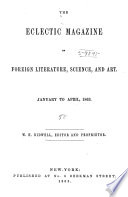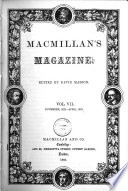 The property which every man has in his own labour, as it is the original foundation of all other property, so it is the most sacred and inviolable. The patrimony of a poor man lies in the strength and dexterity of his hands; and to hinder him from employing... The property which every man has in his own labour, as it is the original foundation of all other property, so it is the most sacred and inviolable. The patrimony of a poor man lies in the strength and dexterity of his hands; and to hinder him from employing...  Blackwood's Edinburgh Magazine - Page 1731856Full view Blackwood's Edinburgh Magazine - Page 1731856Full view - About this book
 | Francis Bowen - 1859 - 576 pages
...more correct view of the subject when he says : u The property which every man has in his own labor, as it is the original foundation of all other property,...dexterity of his hands ; and to hinder him from, employing this strength and dexterity in what manner he thinks proper, without injury to his neighbor, is a plain... | |
 | H. H. B., H. H. BURKE - 1861 - 338 pages
..."Wealth of Nations," states that as the property which every man has in his own labour, is the organic foundation of all other property, so it is the most...man lies in the strength and dexterity of his hands ; to hinder him, therefore, from receiving the reward of his labour, his wages, is a direct violation... | |
 | 1863 - 778 pages
...policy of justice and equal laws. A rguing againstthe law of apprenticeship, the philosopher said : " The property which every man has in his own labour,...strength and dexterity in what manner he thinks proper for his own advantage is a plain violation of that most sacred property. It is a manifest encroachment... | |
 | John Holmes Agnew, Walter Hilliard Bidwell - 1863 - 552 pages
...law of apprenticeship, the philosopher said : " The property which every man has in his own labor, as it is the original foundation of all other property,...strength and dexterity in what manner he thinks proper for his own advantage is a plain violation of that most sacred property. It is a manifest encroachment... | |
 | 1863 - 522 pages
...againstthe law of apprenticeship, the philosopher said : " The property which every man has in his ото labour, as it is the original foundation of all other...and to hinder him from employing his strength and ik'xtcrity in what manner he thinks proper for his own advantage is a plain violation of that most... | |
 | esq Henry Jenkins - 1864 - 800 pages
...their duration, is now entirely left to be adjusted by the parties themselves. — M' Culloch], 54. THE property which every man has in his own labour,...dexterity of his hands ; and to hinder him from employing this strength and dexterity in what manner he thmka proper without injury to his neighbour, is a plain... | |
 | Charles Knight - 1866 - 464 pages
...— Poor-law — Law of settlement. A DAM SMITH, in his great work, "The Wealth of Nations," says, " The property which every man has in his own labour,...dexterity of his hands ; and to hinder him from employing this strength and dexterity in what manner he thinks proper, without injury to his neighbour, is a... | |
 | Charles Tennant - 1866 - 894 pages
...other questions, has said on this question : — " The property which every man has in his own labor, as it is the original foundation of all other property,...dexterity of his hands, and to hinder him from employing this strength and dexterity in what manner he thinks proper, without injury to his neighbor, is a plain... | |
 | James Ward - 1868 - 348 pages
...entitled to the same protection, as a property, with capital. Adam Smith has justly remarked that — ' The property which every man has in his own labour,...dexterity of his hands; and to hinder him from employing that strength and dexterity in what manner he thinks proper, without injury to his neighbours, is a... | |
 | Erasmus Peshine Smith - 1868 - 274 pages
...for their condemnation ; nor can a more conclusive one be found than that of Adam Smith. He says : " The property which every man has in his own labour,...dexterity of his hands ; and to hinder him from employing this strength and dexterity in whatever way he thinks proper, without injury to his neighbour, is a... | |
| |